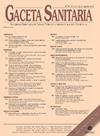El riesgo autopercibido de padecer cáncer en España: un estudio transversal
IF 1.5
4区 医学
Q3 HEALTH CARE SCIENCES & SERVICES
引用次数: 0
Abstract
Objective
To identify the variables that influence the most the self-perceived risk of developing cancer and to explore the main reasons associated with the degree of self-perceived risk.
Method
A cross-sectional study was carried out using a questionnaire designed ad hoc, between February and September 2020. A total of 4769 responses were collected by telephone from men and women over 18 years of age residing in Spain, with a response rate of 29.6%. A descriptive analysis and a binary logistic regression model were performed using the self-perceived risk of developing cancer as the dependent variable.
Results
More than 60% of the participating population believe they have a very high or high risk of being diagnosed at some point in their lives. Having experienced cancer either firsthand or through close family members substantially increased the probability of having a very high or high risk of developing the disease (aOR: 3.243, 95% CI: 2.284-4.605, and aOR: 3.950, 95%CI: 3.316-4.706, respectively). In addition, other sociodemographic and attitudinal variables have been shown to influence the self-perceived risk of developing cancer.
Conclusions
Close experiences with cancer, either one's own or someone else's, have a significant impact on the higher perception of risk of suffering from the disease. Other variables related to lifestyle or sociodemographic profile that increase the probability that this perception is higher. Therefore, these findings highlight the importance of reinforcing public policies in the field of primary and secondary prevention in order to improve the perception of cancer risk in less aware people.
西班牙自我感知的癌症风险:一项横断面研究
目的确定影响癌症自我感知风险的主要变量,探讨影响癌症自我感知风险程度的主要原因。方法在2020年2月至9月期间使用临时设计的问卷进行横断面研究。通过电话收集了4769份来自18岁以上居住在西班牙的男性和女性的回复,回复率为29.6%。以自我认知患癌风险为因变量,进行描述性分析和二元logistic回归模型。结果超过60%的参与者认为他们在生命中的某个阶段有很高或很高的被诊断出患有乳腺癌的风险。亲身经历过癌症或通过亲密家庭成员经历过癌症大大增加了患癌症的极高或高风险的概率(aOR: 3.243, 95%CI: 2.284-4.605, aOR: 3.950, 95%CI: 3.316-4.706)。此外,其他社会人口统计和态度变量已被证明会影响患癌症的自我认知风险。结论与癌症有过近距离接触的人,无论是自己的还是他人的,都对患癌症的风险有很大的影响。其他与生活方式或社会人口特征相关的变量也增加了这种看法的可能性。因此,这些发现强调了加强一级和二级预防领域的公共政策的重要性,以提高对癌症风险认识较低的人的认识。
本文章由计算机程序翻译,如有差异,请以英文原文为准。
求助全文
约1分钟内获得全文
求助全文
来源期刊

Gaceta Sanitaria
医学-公共卫生、环境卫生与职业卫生
CiteScore
4.10
自引率
5.30%
发文量
80
审稿时长
29 days
期刊介绍:
Gaceta Sanitaria (Health Gazette) is an international journal that accepts articles in Spanish and in English. It is the official scientific journal of the Sociedad Española de Salud Publica y Administración Sanitaria (Spanish Society of Public Health and Health Administration) (SESPAS).
The Journal publishes 6 issues per year on different areas of Public Health and Health Administration, including:
-Applied epidemiology-
Health prevention and promotion-
Environmental health-
International health-
Management and assessment of policies and services-
Health technology assessments-
Health economics.
The editorial process is regulated by a peer review system. It publishes original works, reviews, opinion articles, field and methodology notes, protocols, letters to the editor, editorials, and debates.
 求助内容:
求助内容: 应助结果提醒方式:
应助结果提醒方式:


